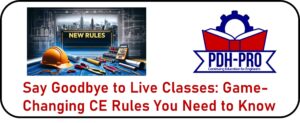Say Goodbye to Live Classes: Game-Changing CE Rules You Need to Know!
Recent Changes to New York PE Continuing Education Requirements
In an effort to provide more flexibility and adaptability in professional development, the New York State Board of Regents has made significant changes to the continuing education requirements for professional engineers (PEs), land surveyors, and geologists. These changes, effective from January 2022, aim to modernize the approach towards earning continuing education credits and expand the range of acceptable subject areas for these credits.
Here’s a breakdown of these major regulatory changes:
Enhanced Flexibility in Course Selection
- Online Courses and Webinars: As of January 2022, engineers have the option to choose between online courses and webinars in any combination for their continuing education credits. This update marks a significant shift from the previous requirements, as there is no longer a mandated number of “live” credits. This allows for greater flexibility in how professionals can earn their credits, catering to diverse learning preferences and schedules. For more information on this specific change, refer to the board’s announcement.
Watch our video summarizing the new rules.
Regulatory Amendments in Engineering, Land Surveying, and Geology
- Approval by the New York State Board of Regents: The regulatory amendments, effective from January 1, 2022, were approved by the New York State Board of Regents. These amendments encompass not just engineering but also land surveying and geology, reflecting a holistic approach to professional development in these interrelated fields.
- Access to the Regulations: For those interested in a detailed understanding of these amendments, they can be reviewed in the Regulations of the Commissioner, specifically under Part 68, which covers Engineering, Land Surveying, and Geology. This document is available on the official website.
Summary of Major Regulatory Changes
- Continuing Education Requirements Flexibility:
- The continuing education requirements can now be completed through various formats, including courses of learning or live classes. This choice rests with the licensee, provided that the continuing education is completed through a Department-approved sponsor and falls within an acceptable subject area.
- Expansion of Acceptable Subject Areas:
- Professional engineers, land surveyors, and professional geologists now have the opportunity to earn continuing education credits in additional subject areas. This includes fields such as architecture, landscape architecture, and interior design, broadening the scope of knowledge and skills that can be developed through these courses.
- Carry Over Credits:
- A new provision allows for the transfer of up to six hours of “carry over” credit from one registration period to the next. This provides additional flexibility for professionals managing their continuing education credits over time. However, there are specific parameters that govern this carry-over process.
These changes reflect a significant shift towards a more modern and flexible approach to professional development for engineers, land surveyors, and geologists in New York. The state’s recognition of diverse learning modalities and expanded subject areas underlines its commitment to the evolving needs of these professions.
FAQs
Do I need to earn 18 hours of credit via live and interactive credits?
No, you do not need to earn 18 hours of credit via live and interactive courses. The recent changes in the rules allow engineers to use online courses for all 36 hours of their continuing education requirements. While live courses are still an option, they are no longer a mandatory requirement. This change provides greater flexibility in how professional engineers can fulfill their continuing education requirements, accommodating different learning styles and schedules.
Can I earn all continuing education credits using online courses?
Yes, the board permits professional engineers to earn all 36 hours of required continuing education credits using online courses. These courses are often referred to as self-directed courses. This means that engineers have the option to complete their entire continuing education requirement through online learning. This flexibility allows for a more convenient and accessible approach to professional development, especially beneficial for those who may have constraints that make attending live courses challenging.
Are there any subject area restrictions for the continuing education courses?
While the New York rule changes have introduced greater flexibility in how professional engineers can earn their continuing education credits, there are still guidelines regarding the subject areas of these courses. The courses must be relevant to the practice of engineering and contribute to the professional knowledge and development of the engineer. This includes areas like technical, ethical, or managerial content related to the practice of engineering. Courses that are not directly related to engineering or do not contribute to professional development may not be eligible for credit.
Is there a provision for “carry-over” credits in the new continuing education requirements?
Yes, the recent amendments to the New York continuing education requirements include a provision for “carry-over” credits. Professional engineers can now carry over a maximum of six hours of excess credit earned during one registration period to the next. This allows for greater flexibility in managing continuing education and eases the burden in cases where an engineer might have earned more credits than required in a given period. However, it’s important to note that these carry-over credits must still meet the criteria of being from a Department-approved provider and fall within the acceptable subject areas for the engineering profession.

Thank you for providing updated and current information for NY licenses.
I thought this post was great Cheers
Your blog is a treasure trove of valuable insights, and I’ve made it a point to visit daily. Kudos on creating such an amazing resource!
Didn’t know that NY changed their rules. This seems like a good change.